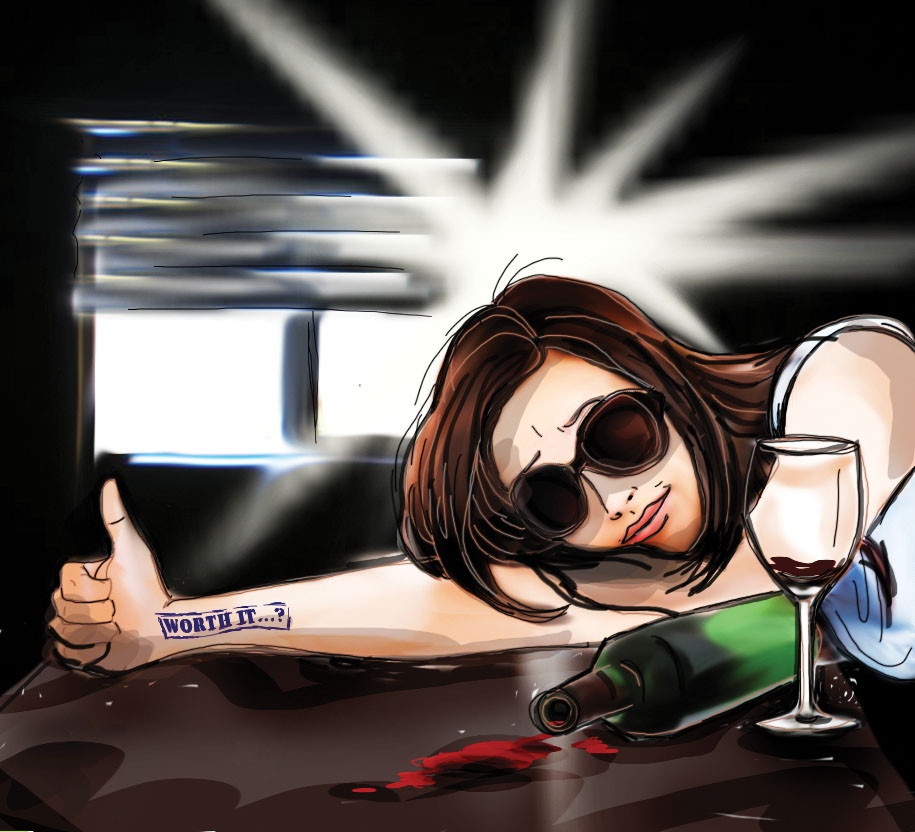Dry Wit
HANGOVERS VS. HAPPINESS
If there’s anything people talk about more than the epic highs of drunken fun, it’s the sluggish haunts of the next day’s hangover. It’s been a while since I had one myself, but I’m still surrounded by the cultural dialogue of hangovers. Tales of amazing nights out and their aftermath fill every stream of social media and ‘How was your weekend?’ responses week after week.
Hangover mythology makes no room for everyday joy. Good times are expected to be ecstatic, yet the highs are often equally matched by the glorified suffering of morning-after lows. Hangover culture bestows drinkers with a haggard badge of honour, as the depth of their pain somehow elevates everything that came before it: it was SO WORTH IT.
While it’s true that sometimes great times and amazing feelings come at the cost of hard work or spectacular larger-than-life experiences, the idea that you have to pay to play can be toxic.
When I first stepped off of the whiskey-fueled feelings rollercoaster that my life had become, I felt muted. My emotional scale no longer went up to 11. It didn’t plunge below zero as often, but I mostly felt like I could dial it up to three or four and then plateau.
I felt a vast distance between my everyday doldrums and the supposed vitality of fellow sober folks telling their stories in sobriety essays. Where was the new lease on life that they had discovered? I felt cheated. I thought I’d just somehow magically feel better, but I didn’t.
Insert the montage: lots of Netflix, soul-searching, some major life changes and – most importantly – time.
After about a year of sobriety, I realized that I’d forgotten how to be happy. Celebration is bottled, and booze is almost unilaterally suggested as a reward or for self-care: “Have a glass of wine – you deserve it.”
I didn’t know how to do good and then feel good, or even how to stumble into those spontaneous moments of exhilaration and truly enjoy them.
Re-learning happiness, and taking the time to appreciate good moments, goes beyond sobriety. Science is working against all of us – and working for hangover mythology – in this department. Our brains are biased towards remembering the negative more than the positive, ‘cause maybe not getting eaten by a bear used to be more important than committing that gorgeous sunset to memory.
A meditation instructor once told me that a crappy experience (like that bear over there) will register immediately. But we need to let a good experience steep for at least 30 seconds for it to make its mark.
Before I found my way back up to 11 on the glee scale, I clambered up to five or six. And just like a five-year-old standing on a snow pile in the corner of a parking lot, after that small climb I felt like queen of the mountain. And the best part about it? When I came back down, I wasn’t any worse off than when I started.
It took a while to truly accept good things. I was waiting for the other shoe to drop, for life’s impending hangover.
While I’ve seen all the trite inspirational memes telling me I deserve happiness (and don’t we all) it wasn’t until I rediscovered feeling good in sober life that I realized what those cheesy scroll letters pasted over flowers could actually mean. Joy is not a debt you have to pay.
It takes a while to get there, but it’s so worth it.
Anastasia Chipelski is the Managing Editor at The Uniter. Look for her on top of the nearest snow pile or small hill, grinning at a stray cat or something.
Published in Volume 70, Number 7 of The Uniter (October 22, 2015)








